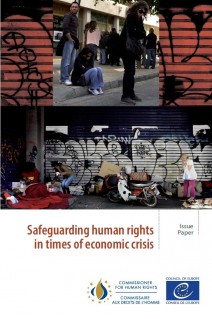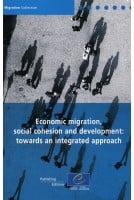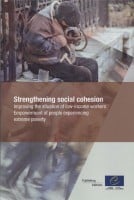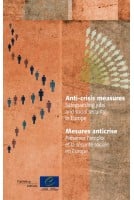

Economic migration, social cohesion and development: towards an... (2009)
- Exclusivité web !


Europeans are living through the deepest economic recession since World War II. What began as a meltdown in the global financial system in 2008 has been transformed into a new political reality of austerity which threatens over six decades of social solidarity and expanding human rights protection across Council of Europe member states.
Austerity measures have exacerbated the already severe human consequences of the economic crisis marked by record levels of unemployment. The whole spectrum of human rights has been affected and many vulnerable groups of people have been hit disproportionately. Poverty, including child deprivation, is deepening and is likely to have long-term effects. The economic crisis is also undermining the capacity of central and local authorities to ensure human rights protection.
Human rights provide a universal normative framework and operational redlines within which governments’ economic and social policies must function. This Issue Paper provides practical guidance to governments in navigating the historic opportunities and difficult policy choices they face in upholding human rights in times of economic constraint. The critical role of ombudsmen, human rights commissions and equality bodies is also highlighted.
The Commissioner for Human Rights proposes a set of actionable recommendations which help forge a new path along which governments can align their economic recovery policies with their commitments for human rights. It is necessary to reinvigorate the European social model based on the foundation of human dignity, inter-generational solidarity and access to justice for all.
List of abbreviations
Summary
The CommissionerÍs recommendations
Introduction
1. Impacts of austerity measures and economic crisis on the enjoyment of human rights
1.1. A typology of austerity
1.2. Economic, social and cultural rights
1.3. Civil and political rights
1.4. Disproportionate impacts on disadvantaged and marginalised groups of people
1.5. Interdependence of human rights and intergenerational effects of austerity
1.6. Impacts on state capacity and the human rights protection system
2. Human rights standards and jurisprudence on austerity
2.1. Human rights as legal imperatives and higher-order policy objectives
2.2. Economic, social and cultural rights norms under austerity
2.3. Civil and political rights
2.4. Rights to transparency, participation and accountability
2.5. Equality, non-discrimination and positive measures
3. Implementing human rights in times of economic crisis
3.1. Institutionalising transparency, access to information and participation
3.2. Conducting systematic human rights and equality impact assessments
3.3. Carrying out systematic human rights screening of budget and fiscal policy
3.4. Promoting equality and combating discrimination and racism
3.5. Ensuring social protection foors for all
3.6. Guaranteeing the right to decent work
3.7. Ensuring access to justice for all and maintaining the human rights protection system
3.8. Engaging and supporting an active civil society
3.9. Regulating fnance in the interest of human rights
3.10. Intergovernmental co-operation and assistance
4. Role of national human rights structures
4.1. NHRSs promoting and protecting human rights in crisis
4.2. Opportunities for advancing human rights-compliant crisis responses
4.3. Empowering NHRSs in times of fscal austerity
Appendix 1 – European Social Charter: signatures and ratifcations
Appendix 2 – European Code of Social Security (ETS No. 48): signatures and ratifcations
Appendix 3 – Optional Protocol to the International Covenant on Economic, Social and Cultural Rights: signatures and ratifcations
Télécharger un extrait (1000)












Europeans are living through the deepest economic recession since World War II. What began as a meltdown in the global financial system in 2008 has been transformed into a new political reality of austerity which threatens over six decades of social solidarity and expanding human rights protection across Council of Europe member states.
Austerity measures have exacerbated the already severe human consequences of the economic crisis marked by record levels of unemployment. The whole spectrum of human rights has been affected and many vulnerable groups of people have been hit disproportionately. Poverty, including child deprivation, is deepening and is likely to have long-term effects. The economic crisis is also undermining the capacity of central and local authorities to ensure human rights protection.
Human rights provide a universal normative framework and operational redlines within which governments’ economic and social policies must function. This Issue Paper provides practical guidance to governments in navigating the historic opportunities and difficult policy choices they face in upholding human rights in times of economic constraint. The critical role of ombudsmen, human rights commissions and equality bodies is also highlighted.
The Commissioner for Human Rights proposes a set of actionable recommendations which help forge a new path along which governments can align their economic recovery policies with their commitments for human rights. It is necessary to reinvigorate the European social model based on the foundation of human dignity, inter-generational solidarity and access to justice for all.
Attention, en vertu de nos conditions générales de vente, l'achat des PDF/epub est réservé aux particuliers.
